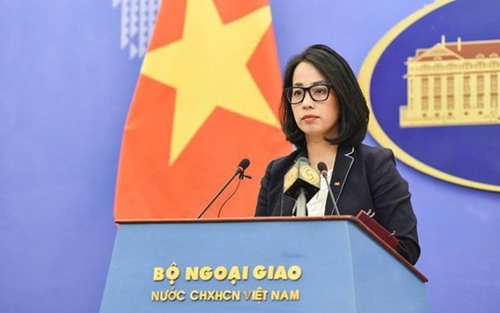Addressing the ministry’s regular press briefing, she stressed that such activities must also respect Vietnam's sovereign right and jurisdiction over the sea areas established in line with the United Nations Convention on the Law of the Sea (UNCLOS) 1982.
    |
 |
|
Deputy Spokeswoman of the Foreign Ministry Pham Thu Hang |
Pham Thu Hang cited Vietnam’s law enforcement forces at sea as saying that the Haiyang Dizhi 4 already left the sea areas of Vietnam.
Regarding the National Natural Science Foundation of China (NSFC)’s announcement of a list of 33 locations to be surveyed regularly, including some routes in the East Sea covering the Truong Sa (Spratly Islands) and sea areas of Vietnam, the deputy spokeswoman said that Vietnam has affirmed repeatedly that it has sufficient legal basis and historical evidence testifying to its sovereignty over the Hoang Sa (Paracels) and Truong Sa (Spratly) Islands in conformity with international law, as well as the sovereign right and jurisdiction over the sea areas established in line with the UNCLOS 1982.
She held that scientific survey and research in Vietnam’s Truong Sa and sea areas, which were established in line with the UNCLOS 1982, without permission from Vietnam violate Vietnam’s sovereignty over Truong Sa and the country’s sovereign right and jurisdiction over its sea areas, so they are valueless.
On April 4, the China Daily publicized an interview with Malaysian Prime Minister Anwar Ibrahim, who was on a visit to China. In the interview, he called for dialogue to resolve disputes in the East Sea and perceived that the problem is not “insurmountable.”
Regarding the remark, Pham Thu Hang stated that as a country staying steadfast in the peaceful settlement of disputes in line with the U.N. Charter and international law, Vietnam backs countries’ cooperation to deal with disputes in the East Sea issue on the basis of respect for the countries’ rights and legitimate interests established by the UNCLOS 1982, and to actively and practically contribute to the maintenance of peace, stability, and legal order at sea, safety and freedom of navigation and overflight, and the sustainable development of seas and oceans.
“With the above-mentioned policy, Vietnam is always ready to join the countries concerned in negotiating and resolving border and territorial issues left over from history, thus actively contributing to the friendship between Vietnam and other countries, as well as to peace and stability in the region and the world,” the official added.
Source: VNA